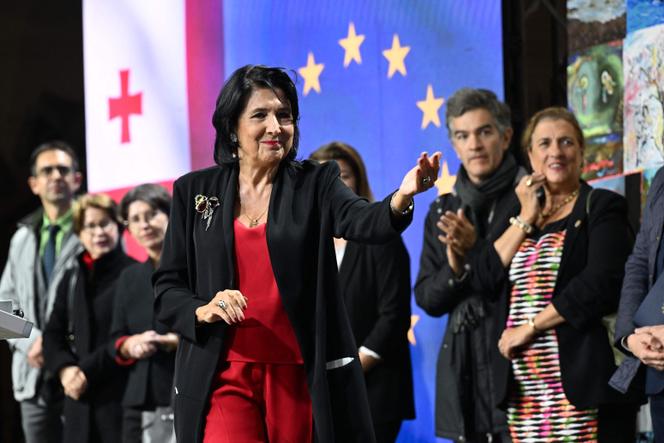


The Georgians had been awaiting this decision for almost a year and a half. After an initial refusal in June 2022, on Wednesday, November 8, the European Commission gave the country a conditional green light to become an official candidate for membership of the European Union (EU). "Georgia has taken steps to strengthen engagement with the EU and increased pace of reforms (...). We recommend that the EU Council grants candidate status to Georgia on the understanding that a number of steps are taken”, said the Commission, the EU's main executive body.
"This is our response to the occupation and to Russia," said Georgian President Salome Zurabishvili (whose powers are limited) of this positive decision on Wednesday evening, speaking to a few hundred people gathered, at her call, in front of the presidential building in Tbilisi, to celebrate the event. Russia has occupied 20 % of Georgian territory since the short war of summer 2008, which resulted in the loss of the separatist regions of South Ossetia and Abkhazia.
In the crowd, Ketevan Chachava, a 35-year-old NGO employee, savored this "day of celebration." "I'm very happy, it's a huge step and a historic opportunity," she said, European and Georgian flags in hand. "It's very important to support Georgia. A refusal would have been a terrible disappointment for the population and a great victory for Russia."
By issuing a positive recommendation, the European Commission has sent a clear signal of support to the population, over 80% of whom are pro-European, according to opinion polls. However, it did not want to give a blank check to the government, which is close to Moscow and has attacked democracy on several fronts. The Commission therefore attached nine conditions to its opinion.
Georgia, a former Soviet republic in the Caucasus, will have to implement "specific reforms" to align itself with the EU's Common Foreign and Security Policy: combating disinformation, polarization of political life and corruption, guaranteeing institutional independence and human rights, and protecting media freedom. It will also have to pursue "de-oligarchization," a term referring to the omnipotence of billionaire oligarch and former prime minister Bidzina Ivanishvili, founder of the ruling Georgian Dream party, who runs the country in the shadows despite the absence of any official function.
Georgia had applied for official candidate status after the start of the Russian invasion of Ukraine, at the same time as Moldova and Ukraine, two other former Soviet republics. The Commission's refusal was a sign of the country's drift away from democracy. Thousands of people demonstrated to show their attachment to Europe and call for the resignation of the government, accused of sabotaging the country's European prospects.
You have 30% of this article left to read. The rest is for subscribers only.
